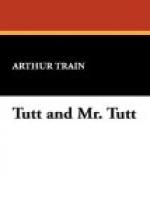Now he—Mr. Tutt—had an interpreter, the well-known Dr. Hong Su, against whom nothing could be said, and upon whose fat head rested no imputation of partiality; a graduate of Harvard, a writer of note, a—
O’Brien sprang to his feet: “My interpreter says your interpreter is an opium smuggler, that he murdered his aunt in Hong Kong, that he isn’t a doctor at all, and that he never graduated from anything except a chop-suey joint,” he interjected.
“This is outrageous!” cried Mr. Tutt, palpably shocked at such language.
“Gentlemen! Gentlemen!” groaned Judge Bender. “What am I to do? I don’t know anything about these men. One looks to me about the same as the other. The court has no time to inquire into their antecedents. They may both be learned scholars or they may each be what the other says he is—I don’t know. But we’ve got to begin to try this case sometime.”
It was finally agreed that in order that there might be no possible question of partiality there should be two interpreters—one for the prosecution and one for the defense. Both accordingly were sworn and the first witness, Ah Fong, was called.
“Ask him if he understands the nature of an oath,” directed O’Brien.
The interpreter for the state turned to Ah Fong and said something sweetly to him in multitudinous words.
Instantly Doctor Su rose indignantly. The other interpreter was not putting the question at all, but telling the witness what to say. Moreover, the other interpreter belonged to the On Gee Tong. He stood waving his arms and gobbling like an infuriated turkey while his adversary replied in similar fashion.
“This won’t do!” snapped the judge. “This trial will degenerate into nothing but a cat fight if we are not careful.” Then a bright idea suggested itself to his Occidental mind. “Suppose I appoint an official umpire to say which of the other two interpreters is correct—and let them decide who he shall be?”
This proposition was received with grunts of satisfaction by the two antagonists, who conferred together with astonishing amiability and almost immediately conducted into the court room a tall, emaciated Chinaman who they alleged was entirely satisfactory to both of them. He was accordingly sworn as a third interpreter, and the trial began again.
It was observed that thereafter there was no dispute whatever regarding the accuracy of the testimony, and as each interpreter was paid for his services at the rate of ten dollars a day it was rumored that the whole affair had been arranged by agreement between the two societies, which divided the money, amounting to some eighteen hundred dollars, between them. But, as O’Brien afterward asked Peckham, “How in thunder could you tell?”
The court’s troubles had, however, only begun. Ah Fong was a whimsical-looking person, who gave an impression of desiring to make himself generally agreeable. He was, of course, the star witness—if a Chinaman can ever be a star witness—and presumably had been carefully schooled as to the manner in which he should give his testimony. He and he alone had seen the whole tragedy from beginning to end. He it was, if anybody, who would tuck Mock Hen comfortably into his coffin.




